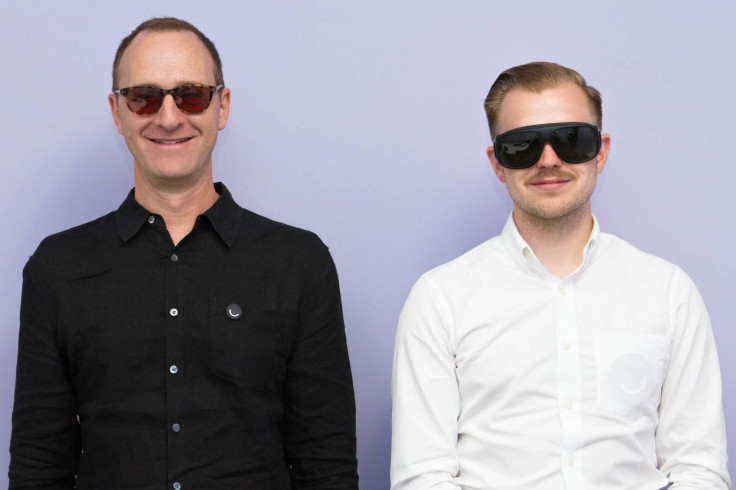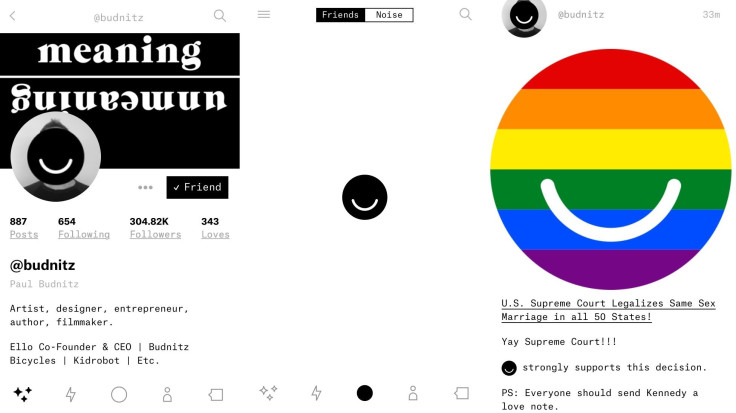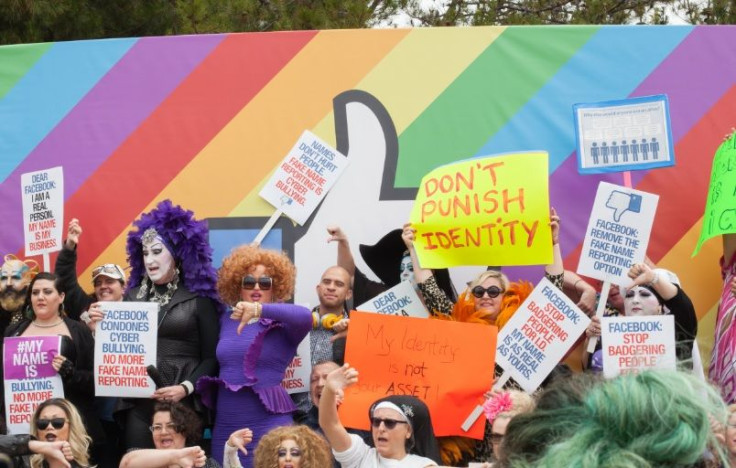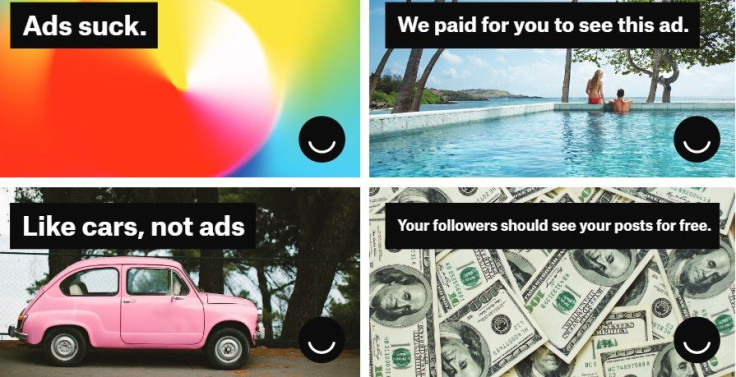What Happened To Ello? The Anti-Facebook Spreads Love To LGBT Community While Avoiding The Trolls

Social networks aren't hard to come by nowadays, but how long can they last? Friendster, founded in 2002 by Jonathan Abrams, and Myspace, founded in 2003 by Chris DeWolfe and Tom Anderson, had their heydays. But then came 19-year-old Mark Zuckerberg and a slew of other young entrepreneurs who built new networks -- Twitter, Instagram, Pinterest, Snapchat -- that have since taken over.
So then, why Ello? Why would a 47-year-old artist and his friends dive headfirst into the crowded pool of social media? In part, because Paul Budnitz was infuriated by the advertising and data mining on the other sites. When Ello launched in September 2014, that mission gained the attention -- and the criticism -- of news organizations. But the Ello team haven't stopped moving forward. The company released a mobile app earlier this month to accompany the desktop site, and this week it bought ads on Facebook in a slightly ironic promotion of an anti-ad campaign.
International Business Times sat down with Budnitz, Ello's CEO, and chief product officer Lucian Fohr to learn how they built a social network that has attracted a reported "many millions" of members, what's happening on the site, their relationship with the drag queen community and what could become of Ello in the future.
International Business Times: You just released a mobile app. Did you see it as a need to have an app? Were people asking for one?
Paul Budnitz: When Ello launched, we actually decided to make it Web-first on purpose. When you think about it, you can think of the growth of Ello a little bit like a neighborhood in Brooklyn or something. We’re designers. It’s the question of, who’s here that’s going to create the community. Who are the people who start awesome new neighborhoods, often? It’s artists, designers, the LGBT community. That happened to be all the people we asked to come start Ello. We chose not to start with the app because we wanted to have higher-quality images and longer-form typing. Not as much chatty stuff and little images. We wanted to separate ourselves.

IBTimes: Take us back to the first moment when you thought of Ello. Did the name Ello come out first?
Budnitz: It was me having lunch with Lucian and his design partner Todd and saying, "All these social networks suck. I don’t want to use any of them. They’re full of boosted posts. They’re ads. I feel manipulated. They’re collecting all my data. It’s just not f------- fun anymore." That was two and a half years ago. We basically sat down and I said, “Why don’t we make our own social network?” And they said, “That’s totally stupid. Let’s do it.”
Lucian Fohr: And what you see on the Web isn’t terribly different from what we designed two and a half years ago.
Budnitz: But it was private. So we built a public version. The only thing you could do on it was post. And two weeks later, Ello blew up. And all these stories about us. We shut the door.
IBTimes: Let’s talk about Ello Pride Day. Have you ever worked with the drag queen community before?
Budnitz: No, not specifically. We have a policy called "art not ads.' It’s an internal thing, like that’s our marketing. We just made a movie with a bunch of animators. We just gave them a bunch of money and said make something that’s about control. We approach or we’re approached by creative people, and we say, “Okay. You can do whatever you want, and we’ll pay for it. Just let us know what the theme is. We want it to be related to something we care about.” For Ello Pride, Sister Indica came up to us and asked to sponsor. And then she asked if a photographer could come. And we said, "Okay." And then a friend of hers called and said, "I’m a documentary filmmaker, I’d like to make a documentary." And we said, "Right on!" And then, the Sisters of Perpetual Indulgence who are a non-profit and they asked will you help us get down there, and we said, “Oh f---it.” We didn’t do this on purpose.

About 500 or 600 people left Ello because of our support for that. But thousands more joined. Ello doesn’t censor. We respect all points of view. We respect if you don’t agree with homosexuality. Please stay on Ello, as long as people are courteous, but we don’t censor. But our company has a point of view. Our company is going to support the queer people who support us and the queer members of our company. We’re free to have a point of view. The issue with the other social networks is they have ads. We don’t have ads, and we can get people to say whatever they want.
IBTimes: But we’ve seen ISIS having this presence on other social networks and these networks having to address that situation. Have you guys at all had that issue yet?
Budnitz: So Ello has rules, and our rules are very simple. We won’t censor and adult and not-safe-for-work content is allowed, but you have to mark your account so that people who don’t want to see it can turn it off. You can turn on and off whether or not you want to see not-safe-for-work content, and you can turn on and off whether or not you post it.
What our rules do not allow is inciting violence or harm toward others, inciting violence or harm to yourself, inciting violence or harm toward animals. Those things we will enforce. ISIS is not on Ello. We planned for a really big customer service department, but we just have so much positivity. We have two people to handle all of it on Ello. We have almost no trolling, almost no negativity.
IBTimes: What’s the theory there? How do you think Ello has been such a positive site?
Budnitz: When we used Facebook when it first came out, it was actually really fun, and then what started happening is all these ads started showing up and then my stream or timeline or whatever that I was looking at it didn’t seem like I was seeing all my friends stuff and then all these ads started popping in. It’d feel a little bit like we’re having this conversation and suddenly in the middle of this conversation this thing comes in and started going, “Nrrr nrrr nrrr nrr.” I think over time people feel like they’re being f----- with. I think it creates a negative feedback loop where people feel like they can be negative because the system itself is using you. Ello feels like a community again.
IBTimes: Is an algorithm going to be necessary as you get bigger?
Budnitz: One of the basic tenants of Ello is you control everything you see by choosing who you follow. Even though there are millions of people on Ello, I choose who I want to follow. If I don’t follow you, I’m never going to see anything from you unless I choose to navigate and find you. Because you really control what you see there’s no need for an algorithm. It’s actually just chronological, and it always be.
IBTimes: What’s the weirdest thing you’ve seen on Ello so far?
Budnitz: So these genius trolls came onto Ello. What they did is they started creating a bunch of accounts, and they would follow themselves. So they had all these followers, but they controlled them all. So then they’d follow other people with all these accounts and other regular, normal, innocent people would follow them, and they would post very weird, hard to understand stuff. It would be random images or weird writing. Very strange, but kind of interesting. Almost like art.
Then what happened is one of them would start abusing another one, another fake account. And then they would complain that Ello isn’t safe anymore because they were being attacked. What we did as an experiment was we loved them up instead. We outed what they were doing but did them in the context of saying how rad they are. And they’ve stayed on the network.
IBTimes: How are you going to make money?
Budnitz: You know Ello makes money now. It’s not profitable, but we’ve been selling t-shirts almost since the first day we launched with our friends at Threadless. I mean it took Twitter like six years to make their first dollar, and we did that not because we think we’re going to support Ello on t-shirts but just to show something and prove something that basically when you’re in alignment with a community, as opposed to ads that go against the interest of the community and data mining. Our t-shirts are designed by artists who use Ello.
We’re going to provide services and the main one is commerce. Imagine that you’re a business and you use Facebook. In order for your followers to see your post you have to pay or one percent or less of your followers will see your post. Okay, go over to Ello, 100 percent of your followers will see all your posts if they choose to follow you. First of all a bar has been raised because you have to be interesting or no one is going to follow you. We’ll provide services there at the end of this year. We’ve created a patented buy button that you can drag to any image, and the button will remain on other networks. Buttons are free. We’ll take a small percentage.

IBTimes: Did you see that New York Times’ piece called “Let Me Pay For Facebook”? What was your reaction to that? Do you think that’s something they should do?
Budnitz: I don’t think Facebook is worth paying for. Facebook is no longer a social network. It’s an advertising platform. Tumblr is no longer a social network. It’s an advertising platform. Twitter is becoming an advertising platform. Although they’re trying to figure out how, and they’re a little confused about it. Pinterest is basically already. Instagram is becoming. We’re a social network.
IBTimes: So who's on Ello right now, and who's coming next?
Budnitz: Imagine throwing a party, and anyone can join the party. People can set the tone for the party that can be really negative. That’s the difficulty of starting a social network. The hard thing is is that it can be a party with no one in it. What we did is say, “Alright. We’re going to throw a party. It’s going to be the best party. We’re going to put all these awesome people in the party by letting them in first.” That’s why it was invitation only, and we’re letting it grow by itself. And now that we’ve defined what’s going on at this party. If you want to join it’s great. If you don’t want to join, go f--- yourself. Fortunately, a lot of people want to join, so it’s working out.
© Copyright IBTimes 2024. All rights reserved.






















